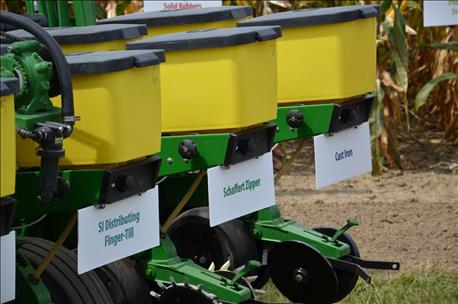
Dave Mengel would call a spade a spade. When the Indiana native was a Purdue University Extension agronomist at Purdue University in the 1980’s, he wasn’t bashful about calling products with low use-rates that shied away from university tests ‘moon dust.’ Mengel, now a professor at Kansas State University, returned to Indiana recently. He hasn’t changed his mind, but the times have changed.

WHICH ONE WORKS? These different types of row closers were tested side-by-side in Beck’s Practical Farm Research Plots, some for three years. Some work better than others, and some work better in some years than others. Beck’s publishes the results, no matter what.
I learned quickly from Mengel, and from experiences on my own, that while perhaps there were legitimate products out there, there were many where real results seemed elusive. I also learned from Mengel that while you might think these products would dry up in tough economic times since farmers wouldn’t buy them, it’s often just the opposite. When dollars are tight and some people are desperate, they’re actually more vulnerable to slick sales pitches.
Personal experience
Here’s an illustration from three decades ago that is as vivid as yesterday. A company selling one of these products, that supposedly helped crops by improving soil properties, sought to be recognized as legitimate. The Prairie Farmer sales rep badgered me until I agreed to talk to them. So I set up a time to meet with the company president.
Alarm bells went off when I arrived in the small town, and discovered the company ‘headquarters’ was in the upstairs of an old brick building. A rotund gentleman greeted me, introduced himself as the president, and sat down at his desk. Cheap wallpaper of a fall scene in the woods seemed to dwarf him.
He told me about the product, and was careful to not make any direct claims to increased yield, or show me any hard numbers on better yield or more profit. It was more about water moving into the soil better and larger roots - all vague stuff hard to quantify. He also handed me a brochure, and I could quickly see it was filled with vague comments.
I was still skeptical, but some of what he said made sense. Then it happened. One of his salesmen, an older gentleman, walked in from the back. The president started to introduce me, but before he could say I was a reporter, the visitor started his rant. Out spewed numbers and dazzling expectations of how great this product performed - nothing he said was printed or had been spoken by the president.
I turned my head around just in time to see the president, with his face beet red, shaking his hands wildly at the salesman. Obviously, he wanted him to stop.
The salesman soon left. I stayed five minutes and left. I never wrote the story. I knew all I needed to know.
Putting ideas to the test
The sad part is that today, insiders say there are products based on biologics that work. The trick is separating them out from those that don’t work.
Ryan McAllister, director of Practical Farm Research for Beck’s, says they tested roughly 200 products, including some new types of equipment, in their plots in 2015. Many didn’t show any yield benefit, but some did.
“We are seeing that certain products return a profit,” he says. “We continue testing them, but we think a farmer ought to take our results, and other sources of information, and decide if there are some of these products that might actually show promise.
“We can pencil out profit for some of these new biologic products, even if it means spending more upfront.”
McAllister realizes they don’t all work. “We’re requiring companies that want us to look at their product to sign an agreement up front,” he says. “If we test it, we’re going to publish the results, whether the product works or not.”
About the Author(s)
You May Also Like




